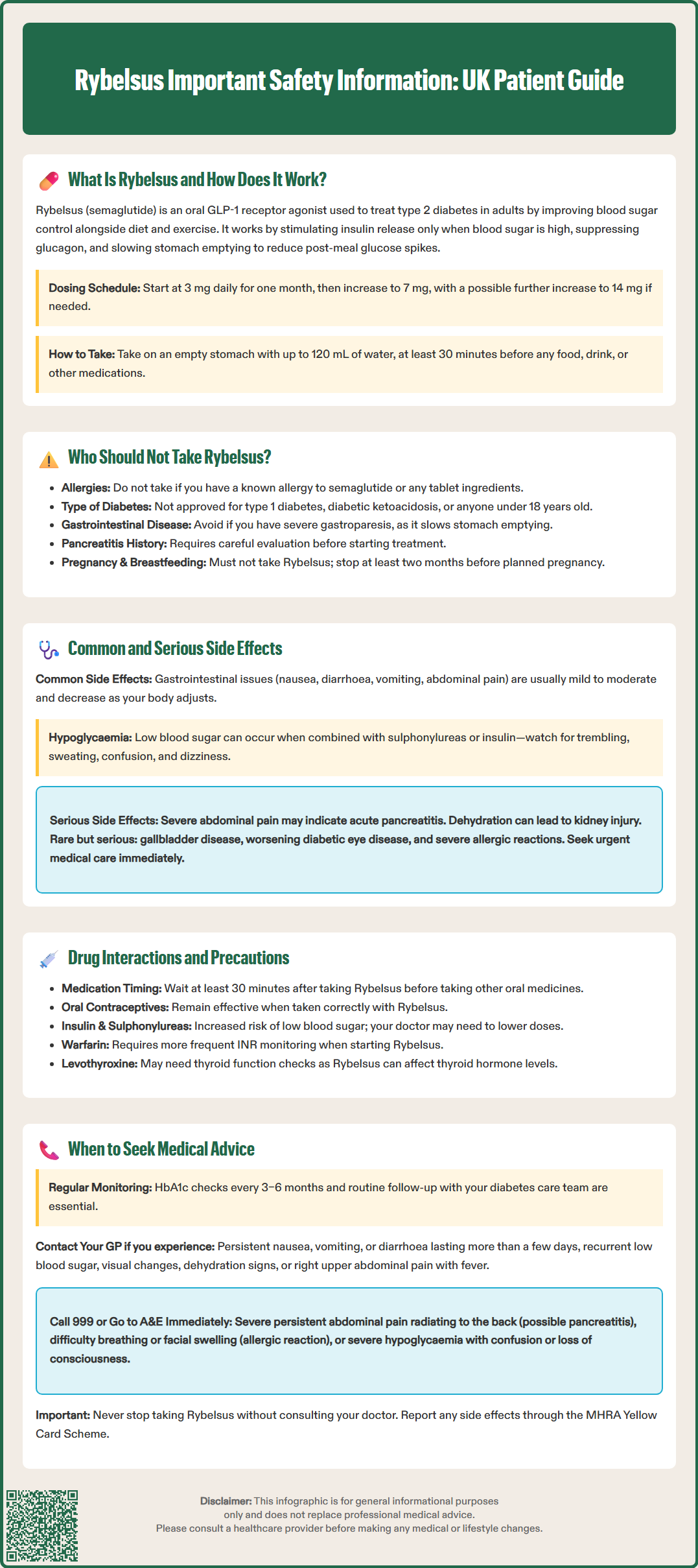
Rybelsus (semaglutide) is an oral GLP-1 receptor agonist licensed in the UK for managing type 2 diabetes in adults. Understanding Rybelsus important safety information is essential for anyone prescribed this medication, as it helps ensure safe, effective treatment whilst minimising risks. This article provides comprehensive guidance on contraindications, potential side effects, drug interactions, and when to seek medical advice. Whether you're newly prescribed Rybelsus or reviewing your current treatment, knowing the key safety considerations empowers you to use this medication confidently alongside your diabetes care team.
Quick Answer: Rybelsus important safety information includes contraindications in type 1 diabetes, pregnancy, and severe gastrointestinal disease, common gastrointestinal side effects, potential serious risks like pancreatitis, and the need for careful monitoring with other diabetes medications.

Mounjaro® is the most innovative GLP-1 medication proven to dramatically curb appetite, hunger, and cravings to help professional men achieve substantial weight loss.
Start Here
Wegovy® is a weekly injectable GLP-1 medication with proven effectiveness in reducing appetite, hunger, and cravings to help busy professionals lose significant weight.
Start HereRybelsus (semaglutide) is an oral medication licensed in the UK for the treatment of type 2 diabetes mellitus in adults. It is indicated as an adjunct to diet and exercise to improve glycaemic control, either as monotherapy when metformin is not tolerated or contraindicated, or as add-on therapy with other diabetes medications.
It belongs to a class of medicines called glucagon-like peptide-1 (GLP-1) receptor agonists. The active ingredient, semaglutide, works by mimicking the action of a naturally occurring hormone called GLP-1. This hormone is released by the intestines in response to food intake and plays several important roles in glucose regulation.
Rybelsus enhances insulin secretion from the pancreas in a glucose-dependent manner, meaning it stimulates insulin release only when blood sugar levels are elevated. This mechanism reduces the risk of hypoglycaemia compared to some other diabetes medications. Additionally, semaglutide suppresses glucagon secretion, a hormone that raises blood glucose levels, and slows gastric emptying, which helps to moderate post-meal blood sugar spikes. Many patients also experience reduced appetite and modest weight loss, which can be beneficial for individuals with type 2 diabetes who are overweight or obese, although Rybelsus is not licensed specifically for weight loss.
Rybelsus is available in three tablet strengths: 3 mg, 7 mg, and 14 mg. Treatment begins with the 3 mg dose for one month as an initiation dose to improve gastrointestinal tolerability, not for glycaemic control. After one month, the dose should be increased to 7 mg once daily. If further glycaemic control is needed after at least one month on the 7 mg dose, it may be increased to 14 mg once daily.
The tablets must be taken on an empty stomach with up to 120 mL of water, swallowed whole (not split, crushed or chewed), at least 30 minutes before food, drink, or other oral medications to ensure proper absorption. If a dose is missed, the missed dose should be skipped, and the next dose taken the following day at the usual time.

Certain individuals should not take Rybelsus due to safety concerns and contraindications. The medication is contraindicated in patients with a known hypersensitivity to semaglutide or any of the tablet's excipients. Allergic reactions, though rare, can be serious and may include symptoms such as rash, swelling, or difficulty breathing.
Rybelsus is not suitable for people with type 1 diabetes or for the treatment of diabetic ketoacidosis, as it is specifically designed for type 2 diabetes management. The medication is also not indicated for use in patients under 18 years of age, as safety and efficacy have not been established in this population.
In animal studies, semaglutide has been associated with thyroid C-cell tumours, although the human relevance of this finding is unknown. Patients should be advised to report symptoms such as a lump in the neck, persistent hoarseness, or difficulty swallowing to their healthcare provider.
Rybelsus is not recommended in patients with severe gastrointestinal disease, including severe gastroparesis (delayed stomach emptying), as the medication further slows gastric emptying and may exacerbate symptoms. Those with a history of pancreatitis require careful consideration, as there have been reports of acute pancreatitis in patients taking GLP-1 receptor agonists, though a definitive causal link has not been established.
Pregnant or breastfeeding women should not take Rybelsus. Animal studies have shown potential harm to the developing foetus, and there is insufficient data on the safety of semaglutide during pregnancy or lactation. Women of childbearing potential should use effective contraception during treatment and discontinue Rybelsus at least two months before a planned pregnancy. If you fall into any of these categories, discuss alternative treatment options with your GP or diabetes specialist.
Like all medications, Rybelsus can cause side effects, though not everyone experiences them. The most frequently reported adverse effects are gastrointestinal in nature and typically occur during the initial weeks of treatment or following dose increases. These include:
Nausea (very common, affecting more than 1 in 10 people)
Diarrhoea and vomiting (common, affecting up to 1 in 10 people)
Abdominal pain and constipation (common)
Decreased appetite and indigestion (common)
These symptoms are usually mild to moderate and tend to diminish as the body adjusts to the medication. Taking Rybelsus exactly as prescribed and following the dosing instructions carefully can help minimise gastrointestinal discomfort. It's important to maintain adequate hydration during episodes of gastrointestinal side effects and to seek medical advice if you're unable to keep fluids down.
Hypoglycaemia (low blood sugar) can occur, particularly when Rybelsus is used in combination with other glucose-lowering medications such as sulphonylureas or insulin. Symptoms of hypoglycaemia include trembling, sweating, confusion, rapid heartbeat, dizziness, and hunger. Patients should be educated on recognising and managing low blood sugar episodes.
Serious side effects, though less common, require immediate medical attention:
Acute pancreatitis: Persistent, severe abdominal pain that may radiate to the back, often accompanied by nausea and vomiting, warrants urgent assessment. If pancreatitis is confirmed, Rybelsus should be discontinued permanently.
Diabetic retinopathy complications: Rapid improvement in blood glucose control has been associated with temporary worsening of diabetic eye disease. Patients with pre-existing retinopathy should have regular eye examinations.
Acute kidney injury: Dehydration from severe gastrointestinal side effects may lead to kidney problems, particularly in patients with existing renal impairment.
Gallbladder disease: GLP-1 receptor agonists have been associated with an increased risk of gallstones and cholecystitis. Symptoms such as right upper abdominal pain, fever, or jaundice should prompt urgent medical assessment.
Allergic reactions: Severe hypersensitivity reactions, including anaphylaxis and angioedema, have been reported rarely.
If you experience any concerning symptoms, contact your healthcare provider promptly for guidance. Suspected adverse reactions should be reported via the MHRA Yellow Card Scheme (yellowcard.mhra.gov.uk or via the Yellow Card app).
Understanding potential drug interactions is essential for safe and effective use of Rybelsus. Because semaglutide slows gastric emptying, it can affect the absorption of other oral medications. This is particularly important for medicines with a narrow therapeutic index or those requiring rapid absorption.
To minimise potential interactions, Rybelsus should be taken with up to 120 mL of water, and patients should wait at least 30 minutes before taking any other oral medications.
Regarding oral contraceptives, clinical studies have shown that semaglutide does not have a clinically relevant effect on the exposure of ethinylestradiol and levonorgestrel when taken according to the recommended administration instructions. Additional contraceptive measures are not routinely required, but correct timing of medication is important.
Patients taking warfarin or other coumarin derivatives should have their INR (International Normalised Ratio) monitored more frequently when starting or adjusting Rybelsus, as a precautionary measure, although no specific pharmacokinetic interaction increasing bleeding risk has been demonstrated.
When Rybelsus is prescribed alongside insulin or insulin secretagogues (such as sulphonylureas like gliclazide), there is an increased risk of hypoglycaemia. Your doctor may need to reduce the dose of these medications to minimise this risk. Regular blood glucose monitoring is essential, particularly during treatment initiation.
Concomitant use with levothyroxine may increase total thyroxine (T4) exposure, so thyroid function should be monitored in patients with hypothyroidism, and dose adjustments made if necessary.
Important precautions include:
Renal impairment: Whilst no dose adjustment is required for mild to moderate kidney disease, caution is advised in severe renal impairment due to limited clinical data.
Hepatic impairment: No dose adjustment is needed for liver disease, but patients with severe hepatic impairment should be monitored.
Elderly patients: No specific dose adjustment is required, though older adults may be more susceptible to gastrointestinal side effects.
Always inform your healthcare provider of all medications, supplements, and herbal products you are taking to avoid potential interactions.
Knowing when to contact your GP or seek urgent medical attention is crucial for patient safety whilst taking Rybelsus. Routine follow-up with your diabetes care team is essential to monitor treatment effectiveness, adjust doses, and screen for complications. Typically, HbA1c levels should be checked every 3–6 months, and treatment should be reviewed if glycaemic targets are not achieved.
Contact your GP or diabetes nurse if you experience:
Persistent nausea, vomiting, or diarrhoea lasting more than a few days, as this may lead to dehydration and require dose adjustment or temporary discontinuation
Unexplained weight loss beyond what is expected with improved diabetes control
Recurrent hypoglycaemia, which may indicate the need to adjust doses of other diabetes medications
Visual changes, including blurred vision or difficulty seeing, particularly if you have pre-existing diabetic retinopathy
Signs of dehydration, such as decreased urination, extreme thirst, dry mouth, or dizziness
Right upper abdominal pain, fever, or yellowing of the skin or eyes, which could indicate gallbladder problems
Call NHS 111 for urgent advice when symptoms are concerning but not immediately life-threatening.
Seek immediate medical attention (call 999 or go to A&E) if you develop:
Severe, persistent abdominal pain that radiates to the back, potentially indicating pancreatitis
Signs of a severe allergic reaction, including difficulty breathing, swelling of the face, lips, tongue, or throat, or widespread rash
Symptoms of severe hypoglycaemia, such as confusion, loss of consciousness, or seizures
Chest pain or symptoms of a heart attack, particularly if you have cardiovascular risk factors
Patients should also report any unusual lumps or swelling in the neck, hoarseness, or difficulty swallowing, as these could indicate thyroid problems, though such occurrences are extremely rare. Regular self-monitoring of blood glucose, adherence to the prescribed dosing schedule, and open communication with your healthcare team will help ensure safe and effective treatment with Rybelsus. Never stop taking Rybelsus without consulting your doctor, as abrupt discontinuation may lead to worsening glycaemic control.
Report any suspected adverse reactions to the MHRA Yellow Card Scheme (yellowcard.mhra.gov.uk or via the Yellow Card app).
No, Rybelsus is contraindicated during pregnancy due to potential harm to the developing foetus. Women of childbearing potential should use effective contraception and discontinue Rybelsus at least two months before a planned pregnancy.
Severe, persistent abdominal pain, especially if radiating to the back, may indicate pancreatitis and requires immediate medical attention. Call 999 or go to A&E for urgent assessment, as pancreatitis is a serious potential side effect requiring permanent discontinuation of Rybelsus.
Yes, Rybelsus increases the risk of hypoglycaemia when used with insulin or sulphonylureas, and your doctor may need to reduce doses of these medications. Always take Rybelsus at least 30 minutes before other oral medications to ensure proper absorption.
All medical content on this blog is created based on reputable, evidence-based sources and reviewed regularly for accuracy and relevance. While we strive to keep content up to date with the latest research and clinical guidelines, it is intended for general informational purposes only.
DisclaimerThis content is not a substitute for professional medical advice, diagnosis, or treatment. Always consult a qualified healthcare professional with any medical questions or concerns. Use of the information is at your own risk, and we are not responsible for any consequences resulting from its use.